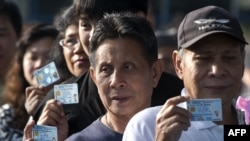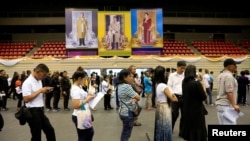A new generation of young, outspoken political leaders is emerging in Thailand’s insurgency-hit southern provinces as a May 14 general election takes place, calling for peace, protection of their culture and identity, and an end to the martial law that targets the majority Malay Muslim population.
Thailand’s Pattani, Narathiwat and Yala border provinces have hosted a long-running conflict between rebels seeking autonomy and Thai security forces. More than 7,000 people have been killed since 2004, most of them civilians.
The rebels are Muslims fighting a Buddhist-majority state, but it is not a religious conflict.
Instead, they say their struggle is to defend their Malay identity, culture and political rights. The zone was colonized more than 100 years ago and has been governed by Bangkok — which put it under martial law 20 years ago but has failed to control the rebellion.
Activists say that law and other security measures have resulted in arbitrary detentions, especially of Muslim youth, harassment by Thai security forces and a culture of impunity.
Politics in the border area has traditionally been dominated by older local leaders with large patronage networks.
In Sunday’s election, though, new voices will be heard, taking off from a wider pro-democracy youth movement that has swept across the rest of Thailand since the country’s last coup in 2014.
“We prioritize peace, justice and fairness … with a secondary focus on economy and security,” Abdulloh Sideh, 25, told VOA. He is running for the newly formed the Fair Party. The party has 12 candidates contesting eight of the south’s 15 constituencies.
Candidates like Sideh have grown up entirely in conflict. They say they represent a young generation sick of being stopped, searched or detained by the state, while being forced to live with the daily threats of violence.
But a high profile can carry risks in the south.
“The young generation think we’re brave … the reality is it’s dangerous, especially bringing up issues of demilitarization and peace talks,” said Sideh. “But the new [generation] never thought that we would sacrifice this much, so we have lit up their hopes, and we have to win because they need change.”
Move Forward, the pro-democracy reform party of the young that is expected to do well in the wider country, is also fielding candidates across the south.
“I’ve spent a decade trying to promote peace in the region, and I’ve never seen this level of engagement,” said Romadon Panjor, aged 42, a Move Forward member of parliament candidate and local peace activist.
“It shows the political arena is a useful platform to discuss local issues and to challenge the old mindset,” Panjor noted.
He says the next Thai government has a chance to make progress on peace talks if it accepts the need to “decentralize [power] and demilitarize” — two of Move Forward’s key principles.
The “hype” around the newcomers is growing, said Artef Sohko, president of The Patani, an advocacy group for self-determination in the southern provinces.
“I don’t think they’ll win anything this time around, but people love these young guys. They are moving the needle.”
He says the Fair Party has brought Malay identity to the forefront of political debate. Previously, many young people were cautious when voicing support for their culture too loudly, fearing they could be associated with the insurgency in the eyes of the watching state.
“They may not win this election, but they are already a success as they have started to remove fear from people in the area … it’s now okay to talk about your identity.”
There are about 1.6 million eligible voters in the three southern provinces, most of them Muslim. About 12 percent on Sunday are first-time voters, from whom the Fair Party is seeking endorsements.
The area is dominated by the Prachachart Party, which wins most seats in the south. But its leaders are older and long established, something activists say has less traction with the young.
Under nine years of the government of Prayuth Chan-ocha, the former army chief who seized power in 2014, peace talks with rebels also have not made significant progress.
Prayuth wants to return to power after Sunday’s election.
Speaking to supporters last weekend in Narathiwat, veteran Prachachart Party chief Wan Muhamad Noor Matha, told supporters he wants to join a new government to help end the special security laws that suffocate the south.
“These laws burn through 30 billion baht [$900 million] per year, but they never benefit a single one of us,” he said.
The border area remains among the poorest parts of Thailand, depending on fruit, rubber and fisheries for income.
For many voters, Sunday’s vote is a chance to back a positive agenda in a zone that for many years has only been associated with conflict.
“Jobs and education are the most important policies for me because we’ve seen an increasing number of people leave to work in Bangkok or overseas,” said trainee nurse Noor Syikeen Yusof, 27.
“And candidates who dare to speak about sensitive subjects are the ones I trust.”






